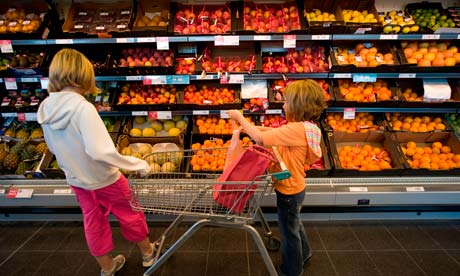
Lower income families in the UK have cut their consumption of fruit and vegetables by nearly a third in the wake of the recession and rising food prices, to just over half of the five-a-day portions that the government recommends for a healthy diet.
Households in the lowest tenth of incomes were buying only 2.7 portions of fruit and vegetables a day at the end of 2010, the latest year for which figures are available, while the average household continued to buy about four portions per person, according to statistics from the Department of Environment Food and Rural Affairs (Defra). For lower income households, that represents a 30% decline in purchases of fresh fruit and vegetables since 2006.
These rates are likely to have declined yet further in the past year, as inflation has continued upwards and households across the board have seen real incomes shrink. Women are likely to be the worst hit by the fall, as research shows mothers tend to deny themselves meals to give more to their children.
"It's very bad news that people on lower incomes are now even less likely to get their five a day. We urgently need to look at this - food and nutrition are at the centre of our national life," said Mary Creagh, Labour's shadow environment secretary.
The deterioration in the diets of those worst affected by the recession will be highlighted on Monday in a parliamentary debate on food, called by Labour. Opposition MPs want faster progress on the proposed grocery code adjudicator, which they said would help ensure fairness among supermarkets, suppliers and consumers, and ways to put a brake on food price inflation.
Farmers have been among the most vocal proponents of a grocery code adjudicator, because they accuse big supermarkets of driving down their prices below the cost of production, and they want to see an end to what they regard as unfair practices. But Labour argues that the adjudicator should also benefit consumers, by stamping out confusing pricing practices and ensuring the bumper profits made by the big chains are not at the expense of households.
Creagh said a debate on food was urgently needed, as rising food prices and poorer nutrition for those in lower income households were problems the coalition government had ignored. She said: "It's an utter disgrace that we are the seventh richest country in the world, and yet we are seeing hundreds of thousands of people going hungry."
She pointed to the Trussell Trust food banks, which handed out food parcels to more than 100,000 people last year, a third of them children. "We have to look this squarely in the face – this invisible hunger is taking root in our society, and it's very much women who are being affected," she said.
Labour will also call for better food labelling and highlight the problem of the increasing expense of school dinners, which councils are charging more for as their funding streams have been cut. The average school dinner has gone up 5p in the past year, to £1.88 in primary schools catered by the local authority, and by 4p to £1.98 in secondary schools.
These price rises could force increasing numbers of parents to take their children out of school meals and make do with a less nutritious meal, Creagh warned.
Families are now spending about £24.50 per person a week on food, equating to about £98 for a family of four. Food spending accounts for 11.5% of income for the average family, but 15.8% for those on low incomes.
Food inflation over recent years has been fuelled by high energy prices, changing consumption patterns around the world, weather patterns and speculation in the commodity markets. Last year, food price inflation reached about 4%.
For a couple with two young children, according to Labour, that added up to an additional £233 on the family food bill over the past year.
Purchases of fresh fruit and vegetables declined most between 2007 and 2010, according to the Defra figures, which were published shortly before Christmas. The report also found people were buying less beef, lamb and fish, but increasing their purchases of cheaper meat such as bacon.

